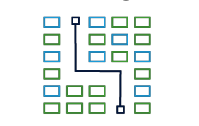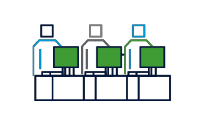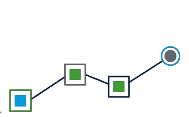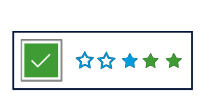When an organization decides to acquire an ERP or CRM system, it is aware that it is a costly process, not only in terms of money but also in time and resources that must be allocated to the project, as well as the impacts that will be generated during and after its completion. Embarking on an implementation without knowledge or experience is a very high risk for any company.
RSM's experts have worked on over 40 ERP and CRM implementation projects with different technological solutions. They are capable of monitoring and coordinating various aspects such as data, personnel, integrations, modules, risks, work plans, contingency plans, commitments, implementers, and a series of variables that, without proper support, the company may overlook.
Project Structuring (PS) allows establishing and organizing all project components, with reference to the purpose, scope, resources, and management mechanisms that will be used to ensure the achievement of the pursued objectives.
Risks of not performing proper structuring:
Confusion due to lack of clarity and definition in fundamental aspects.
Increases in deadlines, costs, resources.
Turning the execution model into a "firefighting" mode.
Continuous confrontations between the client and the provider.
Increased chances of failure.

The Analysis and Evaluation of IT Solutions and Providers (AESIP) incorporates activities to ensure proper selection of solution and implementer. This methodology will be used as a reference, emphasizing activities up to the generation of RFPs (Request For Proposal).
An important differential of our methodology is the emphasis we place on evaluating the implementer's experience and vision in Understanding, Managing, and Controlling the project, rather than simply assessing the tool's ability to meet technical/functional requirements.

This service aims to support the successful development of the project in terms of objectives, scope, deadlines, and budget, aligned with the client's goals and strategies: Generating the expected value for the organization and achieving effective utilization of the tool among users.
Why conduct AGP?
It is necessary to protect the investment made in Licenses, Consulting, Platform, Internal Resources.
It is important to minimize the experience gap between the implementer and the client.
A third party with experience in Assurance knows where and when to focus attention.

Having a PMO in large ERP and CRM implementation projects allows:
Ensuring alignment of work teams in project execution.
Introducing improvements in Corporate Governance by facilitating decision-making and control by organizing projects into a prioritized portfolio.
Introducing improvements in Project Measurement and Monitoring, facilitating appropriate tools to define common goals and objectively evaluate the performance and benefits that the project brings to the company.

Strategic projects such as ERP and CRM implementations typically require a manager who has participated in similar experiences. Some organizations prefer to delegate this function to a third party with experience, who is certified or familiar with project management methodologies. RSM offers this service to support companies that prefer this alternative over Project Management Assurance.

The IT solutions are evolving and providing greater support to companies, and it is a fact that businesses are dynamic and must update their ERP and/or CRM solutions to properly support their strategy, processes, changing regulations, and provide better support to their customers. With this service, we advise organizations that already have an ERP and/or CRM solution and can enhance the use of these solutions, thereby leveraging the investment made in their implementation.

Based on our experience, it is estimated that the license underutilization time can reach up to 60% or more in some specific cases. It is necessary to analyze the reality of usage behavior, aiming to optimize licensing through an optimal interaction model. At RSM, we have tools and mechanisms to analyze the usability level of the solution, allowing us to update the real needs and define an adjustment plan according to the findings.









